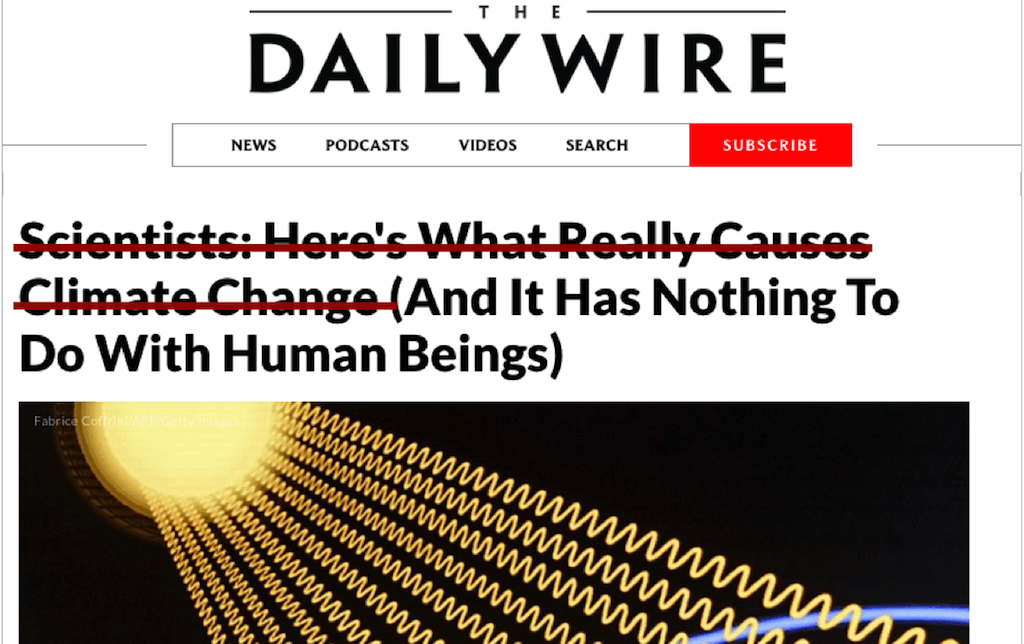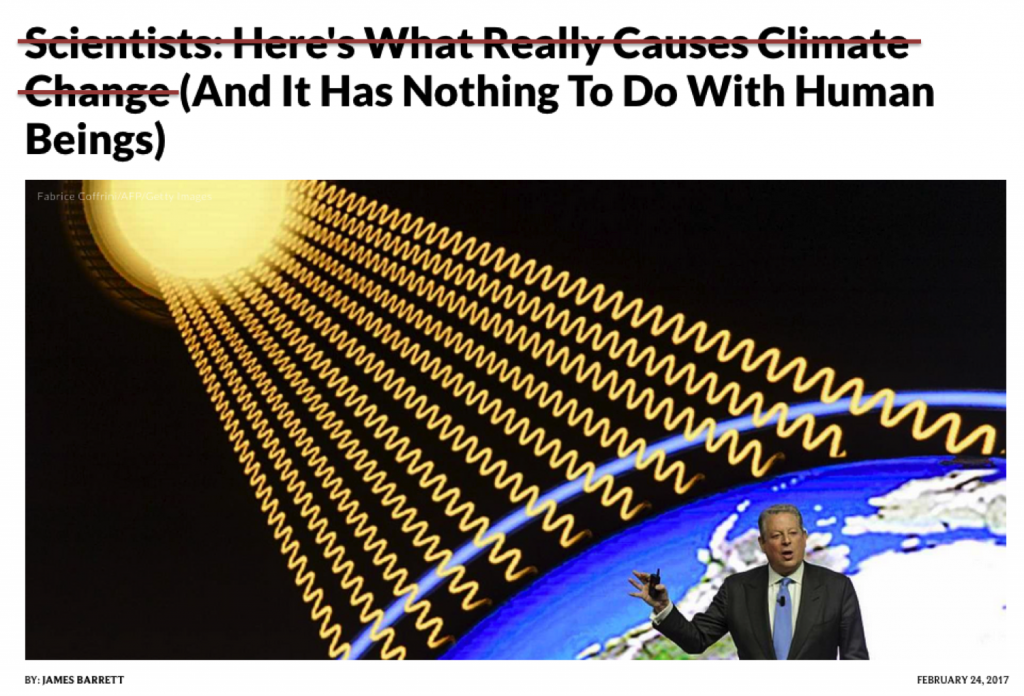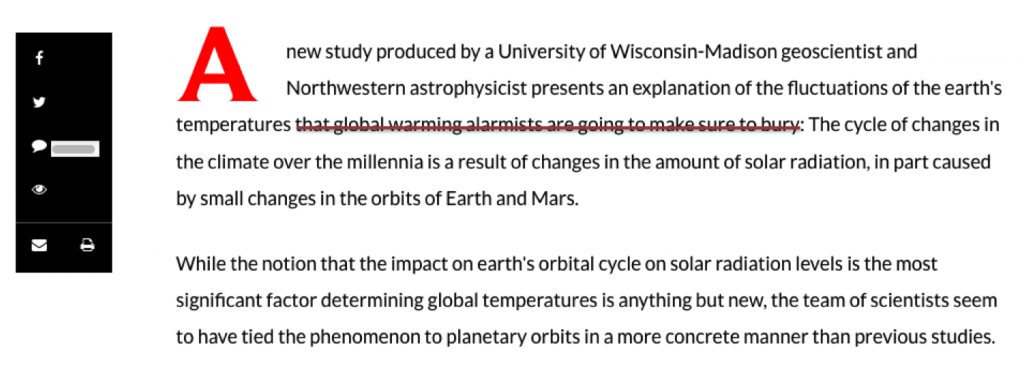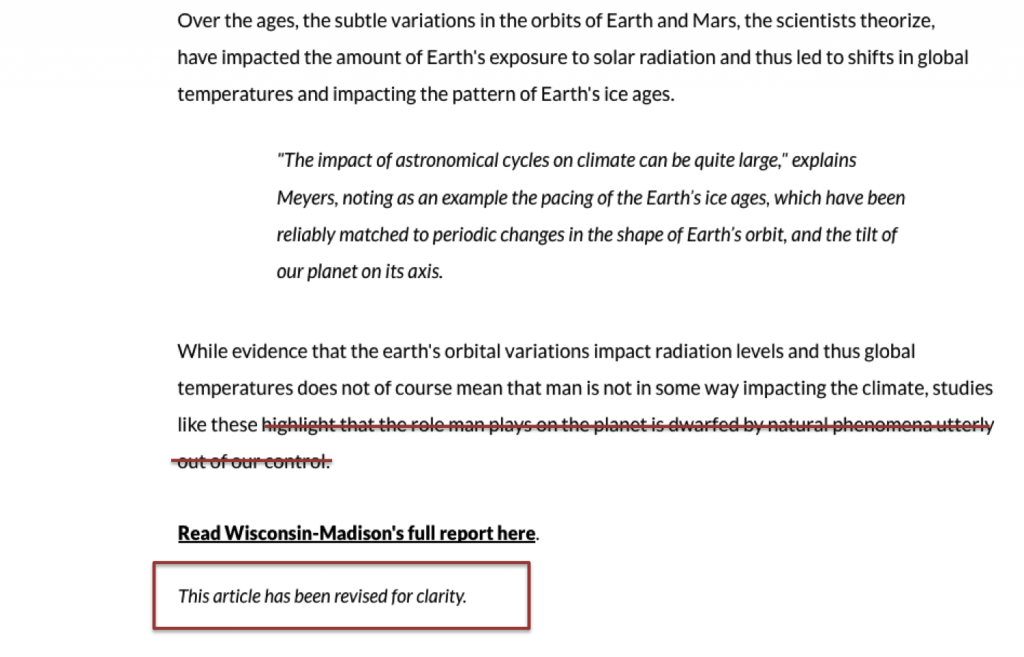
Following on Climate Feedback’s analysis of its story titled “Scientists: Here’s What Really Causes Climate Change (And It Has Nothing To Do With Human Beings)”, the Daily Wire has corrected key statements in the brief post—including the headline. Unfortunately, the large number of people who read this widely-shared story are unlikely to see that it has been corrected.
The post now runs under the title “New Studies Found Something That Really Causes Climate Change (And It Has Nothing To Do With Human Beings)”. Sentences that described a recent study published in the journal Nature as challenging the role of humans in modern global warming—incorrectly, as scientists who reviewed the story explained—have been changed to simply refer to the workings of the climate system as complex and uncertain. For example, the opening section was changed from (bolded for emphasis):
“A new study produced by a University of Wisconsin-Madison geoscientist and Northwestern astrophysicist presents an explanation of the fluctuations of the earth’s temperatures that global warming alarmists are going to make sure to bury: The cycle of changes in the climate over the millennia is a result of changes in the amount of solar radiation, in part caused by small changes in the orbits of Earth and Mars.“
…to something more general:
“A new study produced by a University of Wisconsin-Madison geoscientist and Northwestern astrophysicist presents an explanation of the fluctuations of the earth’s temperatures in the past that highlights the complexity of the forces at work on the earth’s climate and how much we still have to learn about them. The study maintains that the cycle of changes in the climate over the millennia is largely a result of changes in the amount of solar radiation, in part caused by small changes in the orbits of Earth and Mars.“
The final sentence was also corrected after scientists who reviewed it explained that it was inaccurate and unsupported by the paper in Nature. It initially read:
“While evidence that the earth’s orbital variations impact radiation levels and thus global temperatures does not of course mean that man is not in some way impacting the climate, studies like these highlight that the role man plays on the planet is dwarfed by natural phenomena utterly out of our control.“
The post now closes this way:
“While evidence that the earth’s orbital variations impact radiation levels and thus global temperatures does not of course mean that man is not in some way impacting the climate, studies like these inadvertently highlight that there are complex natural phenomena impacting the planet that are utterly out of our control and about which we still have much to learn.“
While the most inaccurate statements have been edited, the scientists who reviewed the post indicate that the implication that the study undercuts confidence in the human cause of modern climate change is still misleading. The research being described doesn’t relate to recent climate history. It relates to differences that existed about 90 million years ago in well-known cycles in Earth’s orbit.
SCIENTISTS’ FEEDBACK
Georg Feulner, Senior Scientist, Potsdam Institute for Climate Impact Research (PIK):
The article has certainly improved, but it is still somewhat biased because it emphasizes the complexity of the Earth system and thus gives the impression that we do not know enough about the climate to take action against global warming. The article, but the new headline in particular, also suggest that the finding of climatic variation due to changes in orbital parameters is something which climate science was not aware of before this study. This is not true, of course, since orbital cycles and their impact on climate have been studied for a long time. In summary, the article is not technically wrong in its current form, but still somewhat misleading.
Chris Brierley, Senior Lecturer, University College London:
I think the article has improved. It now doesn’t include any demonstrably wrong statements, but is still somewhat misleading about its implication. You could easily write “Scientists find climate when Humans didn’t influence climate—as only dinosaurs lived then”.
I fundamentally still feel that their article has arisen because of the Nature research that they no longer cite (“A simple rule to determine which insolation cycles lead to interglacials” by Tzedakis and colleagues). The research they do discuss is all about changes in orbits in the solar system—the climate angle is just inherent in their methodology (along with the assumption that dinosaurs didn’t alter climate). Instead, the other Nature research is about how melting of the ice-sheets are caused by changes in the Sun’s incoming radiation and that CO2 doesn’t matter for it.
Francois-Marie Breon, Senior Scientist, Commissariat à l'Energie Atomique:
The corrections certainly go towards the right direction. Insisting that climate change is unrelated to human beings in the title remains misleading as it does not mentions the fact that the study is about what happened millions of years ago. But this may be seen as a way to catch the reader attention.
The last sentence, which was corrected, is now better. I believe it is confusing but not wrong.
Sentences that have been modified or removed from the original article are highlighted in red:





